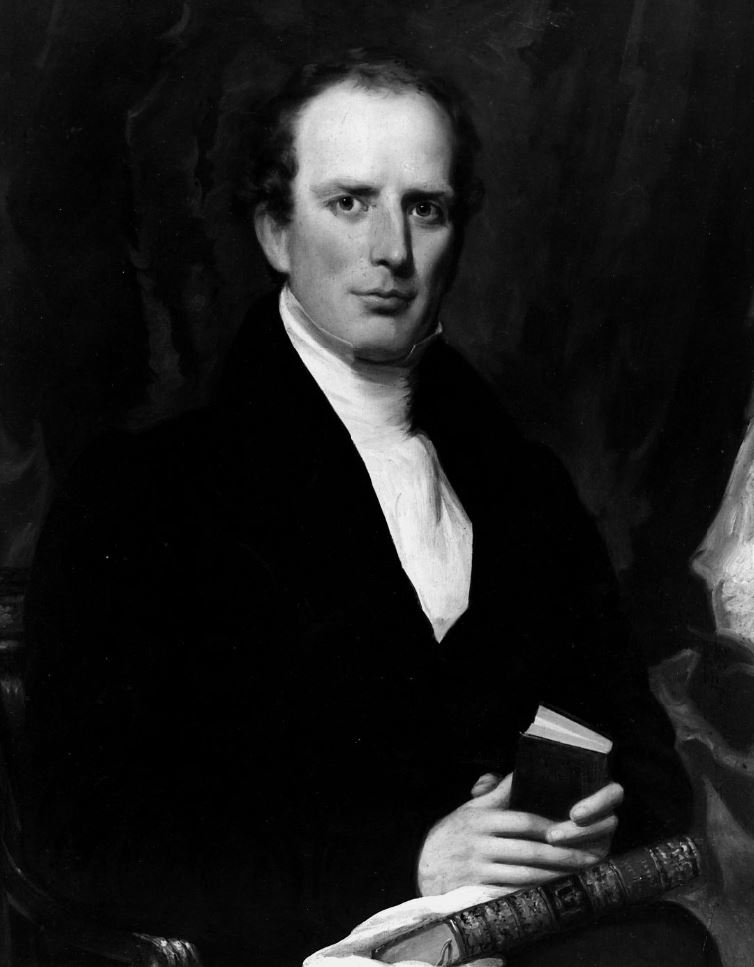


Charles Grandison Finney – Father of modern revivalism and the leading figure of the Second Great Awakening
Introduction
Charles G. Finney’s (1792-1875) unique methods of evangelism earned him the title of the “father of modern revivalism.” His methods paved the way for other mass-evangelists, like Dwight L. Moody, John W. Chapman, Billy Sunday, and Billy Graham, who adapted and built upon Finney’s methods.
Background Information
With this revival account being one in a sequence of revivals during the life of Charles G. Finney, we recommend first reading our accounts of the initial revivals he was involved with in the northern and central part of New York State:
► 1824 Evans Mills German Settlement Revival
► 1824 Antwerp, New York Revival
► 1824 Revival at Perch River and Other Locations
► 1825 Revival in Gouverneur, New York
► 1825 Revival in De Kalb, New York
► 1825 Revival in Western, New York
► 1825 Revival in Rome, New York
► 1826 Revival in Utica, New York
► 1826 Revival in Auburn, New York
► 1826-1827 Revival in Troy, New York
► 1827 New Lebanon & Stephentown Revivals
► 1827-1829 Revival at Wilmington and Philadelphia
From Philadelphia to Reading
In the winter of 1829, Charles Finney ended his work with the Philadelphia Revival and traveled about 50 miles northwest to the town of Reading, Pennsylvania, arriving on January 9, 1829 (he continued there till around the first of May).
Conditions in Reading, Pennsylvania
In Reading there were several German churches and one Presbyterian church. The pastor of the Presbyterian church was John Ferguson Grier (1783-1829). It was through the request of Grier and the elders of that church that Finney went to Reading.
After Finney inspected the spiritual condition of the community, and the Presbyterian church in particular, he said:
I soon found, however, that neither Dr. Greer [Grier], nor any of his people, had any just idea of what they needed, or what a revival really was. None of them had ever seen a revival, so far as I could learn.
In the February 24, 1829, edition of The Western Recorder [a Baptist publication], it was reported that Reading
Contained about 10,000 inhabitants, has never before witnessed a revival. Religion and morals in the place had degenerated to a degree almost beyond parallel.
Finney’s initial efforts to awaken the people were greatly hindered due to there being no meetings held at the church for preaching, teaching, or prayer on the weekdays. In addition, a ball (dance party) was scheduled for every other week and it was attended by many of the members of the church, with one of the church’s elders (John McKnight) being one of the organizers (dances were considered a worldly pastime in this era). And with the Rev. Grier not saying a word against the balls, Finney told him:
In less than one month I shall preach myself out of your pulpit or Mr. McKnight out of his balls.
With that statement, he was telling Grier that those balls must end, or he would terminate his work in that church. The result was that John McKnight stopped attending the balls.

Typical ball dance of that era
Inquiry Meeting Announced
Finney then launched an aggressive approach to awaken the congregation to their need for personal as well as corporate revival. This approach involved him preaching frequently for three weeks.
► He preached three times on Sundays.
► He preached on four other days during the week.
On the third Sunday of this preaching schedule, he announced he would conduct an inquiry meeting the following evening. (Inquiry meetings were specifically for those who were concerned about their spiritual condition and wanted assurance of salvation.)
When Finney presented the invitation for people to come to the inquiry meeting, he said that it was only for those
that were seriously impressed with the state of their souls… and to receive instruction on what they should do to be saved.
Results of the Inquiry Meeting
With Monday being a cold and snowy day, Finney questioned whether there would be a good turnout at the inquiry meeting. And with this type of meeting being a new and an unheard-of thing, his doubts of a significant response were increased.
Yet when Finney arrived at the church, he found the room full, and it was attended by “the most respectable and influential portion of his [Grier’s] congregation.”
During the meeting, Finney opened by giving a brief introduction and then began speaking with people individually and in private.
Finney recognized that the people were blanketed by severe conviction of their sins. Grier followed Finney silently as they talked privately with the individuals. As they were making their rounds, Finney noticed that Grier was struggling to control his emotions, as he had never witnessed such a move of the Holy Spirit as he was now observing.
After Finney spoke with the people individually, he went to the podium and spoke to them for a little over 30 minutes, giving them directions on how to commit themselves to God and to renounce all the sins in their lives.
For those who wanted to surrender to God, Finney invited them to kneel down, and he, kneeling down with them, began to pray, consecrating them all to God.
There was an awful solemnity pervading the congregation, and the stillness of death, with the exception of my own voice in prayer, and the sobs and sighs and weeping that were heard more or less throughout the congregation.
Finney then arose, and all the people with him. He then blessed and dismissed them.
Death of Rev. John Grier
That evening, following the inquiry meeting, the beloved pastor, John Grier, passed away while in bed. It was a great shock to the people, and it created a diversion in the revival for a week, but after the funeral, the revival “took on a powerful type, and went forward in a most encouraging manner.”

The Conversion of Amos Buck
Amos Buck was identified as being the first convert during the Reading Revival. Finney described him as a “proud specimen of humanity,” meaning he was physically a very strong man as well as being “a man of great force of will and strength of nerve.” Though Buck’s wife was a Christian, he assumed he had no need of a savior.
After attending a meeting with his wife, Buck went home, with the sermon he just heard having “torn him to pieces.”
The conviction of sin on this man was so intense that his emotions overcame him and he lost all bodily strength. With his family fearing he would die unless he could be given hope, they sent for Finney.
Finney was staying about one-quarter of a mile from the Buck home, and he immediately made the visit, and upon arrival he said that he heard the man “moaning” and “howling,” and that was while he was still outside the home.
This was Finney’s description of what he witnessed upon entering the home:
He was writhing in agony, grinding his teeth, and literally gnawing his tongue for pain. He cried out to me, “O Mr. Finney! I am lost! I am a lost soul!” and added several things that still increased the shock upon my nerves. I recollect exclaiming, “If this is conviction, what is hell?”
Kneeling down next to the man, who was lying on the floor with his head propped up by his wife, Finney gave him directions for salvation, and immediately his demeanor changed from utter fear to being “free and joyful in hope.”
Seeing the many life transitions taking place, John McKnight, the elder who previously was organizing balls, made a commitment of his life to the Lord and became a valuable helper in the revival. This then led to his entire family embracing Christ as their Savior.
Distillery Plans Cancelled
Dennis O’Brien was a businessman in Reading. He had just invested a large sum of money in setting up an extensive distillery for the production of whiskey. His conversion to Christ during the revival brought an end to that business venture. Though the equipment was all purchased, he refused to start up the operation, and he also refused to sell it to someone else.
The result of his decision, even at the loss of a huge amount of money, was the conversion of all in his household, as well as many members of his extended family.
Not long after this, Dennis O’Brien was overtaken with sickness and was dying. Finney visited him on a Sunday morning before a church service, and knowing he was to soon pass away, said to him:
“Give my love to Brother Grier when you get to heaven.” He smiled with holy joy and said to me, “Do you think I shall know him?” I said, “Yes, undoubtedly you will know him. Give him my love, and tell him the work is going on gloriously.” “I will, I will,” said he.
Adversarial Newspapers
There were two newspapers in Reading, with the editors being opponents of the revival, and of true Christianity in general. The editors of these papers were
drinking men, and were not infrequently carried home, on public occasions, in a state of intoxication.
With these newspapers attacking the revival, Finney found it necessary to speak against the editors from the pulpit, and the result was an immediate cessation of attacks in print.
Result of the Revival
► The majority of the congregation of the Presbyterian church were converted during the revival. This was at a time when the theology in some churches was such that they taught that a born-again experience was unnecessary. Many of the ministers and elders of such churches had never had a conversion experience.
► The number of converts was not recorded, as Finney wrote:
I never was in the habit of counting or publishing the number of converts. There were many very striking conversions; and so far as I know Dr. Greer’s [Grier] congregation was left entirely united, greatly encouraged and strengthened, and with large additions made to their number.
Primary Sources
► Chapter XIX Revival at Reading, Pennsylvania: The Memoirs of Charles G. Finney by Charles G. Finney
► The Memoirs of Charles G. Finney: The Complete Restored Text by Charles G. Finney
Secondary Sources
► Charles G. Finney by Wikipedia
► Charles Grandison Finney & the Second Phase of the Second Great Awakening by Christian History Institute
► Eerdman’s Handbook to Christianity in America by Mark A. Noll
► Fire From Heaven by Robert Evans
► Great Revivals and the Great Republic by Warren Candler
► Man of Like Passions: The Life Story of Charles Grandison Finney by Richard E. Day
► Memoirs of Revivals of Religion by Charles G. Finney
Return to List of Revival Stories
Chet & Phyllis Swearingen:
Office: (260) 920-8248
romans1015@outlook.com
Beautiful Feet
P.O. Box 915
Auburn, IN 46706

